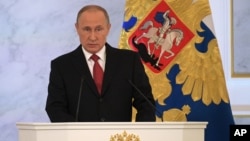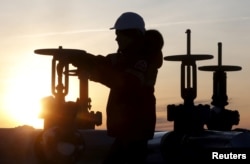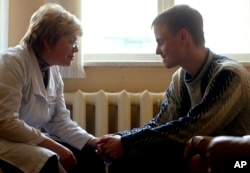Russian President Vladimir Putin's annual "state of the nation" address Thursday was less remarkable for what it contained than for what it lacked -- anger and blame heaped on countries supposedly looking to make an enemy of Russia.
Last year's speech at the Kremlin to lawmakers and dignitaries, carried live on Russian TV, focused on demonizing Turkey after its air force shot down a Russian plane along its border with Syria. Putin's 2014 address, in the wake of sanctions over Russia's annexation of Crimea and support for rebels in Ukraine, was all about the West's diabolical plan to weaken Russia by any excuse possible.
Change in tone
In comparison, Putin this year appeared downright conciliatory, as he only touched on Western sanctions that he said were "an attempt to get us to dance to another's tune and ignore our own fundamental national interests." Turkey, whose president, Recep Tayyip Erdogan, reconciled with Putin in June, was not even mentioned.
Instead, Putin spent more than half of the 70-minute speech talking about domestic issues like social welfare and the struggling economy before turning to foreign policy.
"We need friends," said Putin. "But we will not allow infringement or disregard of our interests. We want to and will independently manage our own destiny, and build the present and the future without others' tips and unsolicited advice."
Putin reached out to U.S. President-elect Donald Trump, saying Russia does not want confrontation with anyone and would like to cooperate on Syria. "And, of course, I count on the alliance with the United States in the fight against the real, rather than fictional threat - international terrorism."
"Basically, he's returning to the kind of tone he used to address the West before Moscow protests and then the second Maidan protests and the Ukrainian and Syrian wars. So, the tone is quite open, quite conciliatory," said Alexander Baunov of the Carnegie Moscow Center.
Strong Putin, weak economy
Analysts say Putin's change in tone was shaped not only by hopes for improved foreign relations, but his belief that Russia's foreign policy efforts have proven correct.
"Putin has successfully reinstated Russia's stature on the world scene, demonstrated to the world that Russia is a global power, that Russia is able to project its military force far away from its borders," said Maria Lipman, editor-in-chief of Counterpoint journal.
A recent poll found Putin's approval rating at 86 percent.
"So this, of course, is strength when the approval rating is so high and when the leader is recognized as the superior arbiter and as a leader of no alternative. This is something that is recognized even by Putin's critics inside Russia," said Lipman.
"If we look at the Russian economy, on the other hand, of course Russia has not become stronger. And, so far, Putin has not demonstrated an ability to convert these two achievements -- approval and universal recognition as a leader of no alternative inside Russia and his stature on the world scene -- he has not been able to convert them into benefits for the Russian people and the potential for development."
Putin touted achievements in agricultural production, information technology, and stabilizing inflation and recession; but, he also repeated that "the main reasons for our economic slowdown are to be found above all in our internal problems, and above all in the lack of investment resources, modern technology, professional human resources, insufficient competition, and shortcomings in our business climate."
Putin warned if steps were not taken, Russia's economy could get stuck at zero growth for some years, noting that the domestic industry development which resulted from sanctions would not last forever.
The Russian president offered few concrete solutions and had a "paternalistic" attitude of the state's role in the economy, said Lipman. "This policy of dominance of the state, the state as the main overseer, supervisor, benefactor, critic -- if need be, I think it will continue.There's no reason to expect otherwise."
HIV ignored
Despite Putin's speech coinciding with World AIDS Day, he made no mention of Russia's growing HIV problem, which some critics have described as an epidemic.
"This is not a subject that the Russian government officials like to talk about," says Lipman. "This is something that is discussed by non-government organizations, by non-government media, but not at a government level. So, the government prefers to look the other way and, at least in public statements, to pretend like the problem doesn't exist."
As of January of this year, more than 1 million Russians were infected with HIV and the rate was growing by at least 10 percent a year.
NGO'S - Social, not political
Putin touched on the need for non-governmental organizations to assume part of the government's responsibility for social welfare.
"He emphasized, many times, so it would be clear to anyone who's interested, that he's not talking about those organizations, non-governmental organizations, that tend to meddle in politics," said Lipman. "He never mentioned the word human rights' or litigation, or those organizations, for instance, whose activities are against torture in the police, against excessive police violence, etc.."
Russia has labeled over 100 Russian civic and charity groups as “foreign agents” and blacklisted a number of international organizations as “undesirable.”
Putin ended the speech to the nation by saying the future of Russia depends "only on us" and stating confidently that "we will achieve the goals we have set for ourselves."






